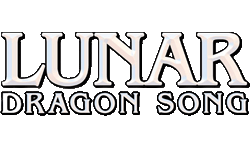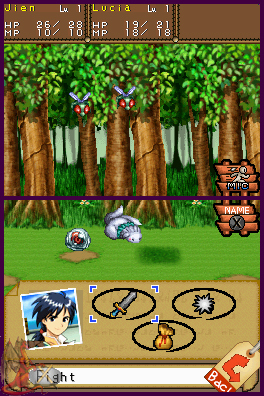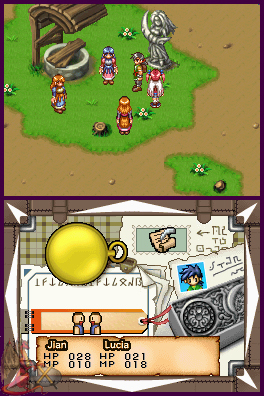|
|

|
PLATFORM
|
DS
|
BATTLE SYSTEM
|

|
INTERACTION
|

|
ORIGINALITY
|

|
STORY
|

|
MUSIC & SOUND
|

|
VISUALS
|

|
CHALLENGE
|
Easy
|
COMPLETION TIME
|
20-40 Hours
|
|
OVERALL

|
+ Easy on the eyes and ears
- Random targeting in battle
- Irritating run mechanic
- Difficult money acquisition
- Random weapon & equipment breaks
|
Click here for scoring definitions
|
|
|
The Lunar series at its best illustrates how 'classic' RPG concepts can still make for a worthwhile play experience. Lunar: the Silver Star and Lunar: Eternal Blue are best known in their Playstation iterations, released at a time when graphics were supposedly of paramount importance, yet successful despite their lack of top-notch effects. Lunar: Magic School never made it out of Japan (for good reason given its dully repetitive nature) but still had some of the Lunar charm. The Lunar charm is entirely absent from Lunar: Dragon Song, which manages to display numerous innovative systems, none of which is enjoyable.
Lunar: Dragon Song's best points are aesthetic, which is a bad sign. Its graphics do not strain the DS much but still look decent, and a few bosses are fairly impressive. Unfortunately those bosses are also rather pixelated, as is some of the in-battle action. A couple of the tunes in the game are directly taken from earlier Lunar titles, with the music in dragon caves sure to be familiar for Eternal Blue players. The original pieces are rather good and worth hearing, with sound effects that are pretty darn good.
Dragon Song's story is not complete rubbish, but it somehow lacks the certain Lunar charm exhibited even by Magic School. Jian Campbell is an errand boy for Gad's Express, which is approximately the equivalent of FedEx on Lunar. He and his companion Lucia (no relation to the Lucia of Eternal Blue) get sucked into Jian's mission to prove human equality to beastmen, though Lucia is far from enthusiastic about it. This propensity for being an arrogant jerk on Jian's part eventually leads into a plot twist that comes straight from The Silver Star, only much less affecting and more perfunctory this time. Ubi Soft's translation is nowhere near Working Designs' level, and the recycling of plot from a previous game in the series is unimpressive.
 What's THIS? An animal attack upon our absolutely assured adventurers, Batman??
What's THIS? An animal attack upon our absolutely assured adventurers, Batman??
|
|
In moving through the environments of Lunar: Dragon Song, enemies will be visible on the screen and are avoidable. Having baldly stated this, I must now proceed to elucidate the two things wrong with the game in its execution of programs in that sentence. Firstly, moving through areas repeatedly is mandatory because even after getting through them once there is no way to use the circumvent the places. Second, enemies are indeed avoidable - but doing so requires running. Particularly in instances where the player simply wants to get through a previously-cleared area quickly this is bad because running costs HP and cannot be done at all if someone in the party is at less than 1/3 HP.
Once combat is joined it is revealed to be turn-based battle taking up both screens of the DS. Again, however, things are very wrong in the implementation of this combat. The standard gripe of turn order being unpredictable is irritating; far more aggravating is the inability of the player to choose targets. If a magic attack is not used (and all offensive magic targets all enemies), simply attacking will have the characters randomly strike at whatever opponent catches their attention. This random targeting cannot be changed. There are also numerous flying enemies on the top screen, and save for Flora's weak arrows they cannot be physically attacked until they come down to the bottom screen, which only happens when the enemy directly below them is slain.
Combat features two other unique aspects that are profoundly irritating. The first is combat having two modes, Althena and Virtue, that are switched between by tapping Jian's face on the touch screen. Althena mode nets experience for the characters, Virtue mode nets items. Having to fight the same enemies twice to get everything they have to offer is intensely irritating. Also, in Althena mode, there are frequently blue treasure chests in areas that will open once all enemies in that area are dead. The problem with this is that a timer ticks down once an enemy is slain, and if the player cannot find another enemy before it hits zero an enemy is restored. In large environments finding the last enemy can be very difficult, often necessitating the use of the run feature. There are later areas with watery places the player cannot march onto and that enemies are inordinately fond of hiding on, also.
 These village women are practicing to be models - they're very good.
These village women are practicing to be models - they're very good.
|
|
And the opening of blue chests is vital thanks to their often containing equipment that is extremely expensive. Enemies do not drop money, ever: instead they will drop items in Virtue mode. But the items in and of themselves are near-worthless. The player must perform missions for Gad's Express in order to gain money, missions that require having certain items in certain quantities. Should those items be lacking, the player must enter into repetitive combat with as many enemies as necessary to gain the requirements. Gad's Express deliveries also require that the correct recipient be identified, which is often a test of memory because many of these people must be tracked down in the correct place of their city. To cap this off, extra weapons and equipment may be needed because certain enemies possess the ability to break these things while they are equipped. Simply saving often is a cumbersome but effective way of dodging this, but it should not be necessary.
Aside from these horrible issues, interaction isn't that bad. Equipment's effects are clearly visible in shops with a quick touch of the L or R button to bring up the respective characters (though not being able to view all three characters in the party at once is mildly irritating). There is a quick way to refresh one's memory on both the next plot destination and the current Gad's Express destination. Saving often is easy to do thanks to the option being available almost everywhere. Moving around the world and locating the necessary person are both frustrating, however.
Despite all the horrendous issues at hand, Dragon Song is fairly easy to complete. Simply hitting auto-battle and resetting if a piece of equipment was destroyed will be enough to deal with most fights, and bosses are easy thanks to the Cards in the game. Cards are occasionally granted by defeated enemies in Virtue mode and certain ones that are available at the game's beginning are insanely useful. One will poison an enemy, any enemy, with poison dealing 5% damage each turn. Others refill HP and MP completely, raise attack power, and some will recharge those simply by walking around for awhile. A few magic recharge Card uses coupled with Jian's incredibly powerful magic in the game's latter half will blow enemies away with ease.
Save for running Gad's Express missions, there are no side quests or optional content and certainly no reason to replay. The game will take somewhere around 25-30 hours to finish, with any time spent trying to accrue funds being responsible for making the game longer.
Lunar: the Silver Star and Lunar: Eternal Blue in particular stand up as entertaining RPGs years later. Lunar: Magic School is repetitive and kind of boring, but not without a wisp of Lunar charm. Lunar: Dragon Song manages to make itself nearly unplayable through the myriad of mistakes its developers made, and in the process shows that innovation alone is not a good thing. The core concepts at hand here might have been entertaining if worked with better, but as Dragon Song stands it should be avoided by all save masochists.
Review Archives
|









